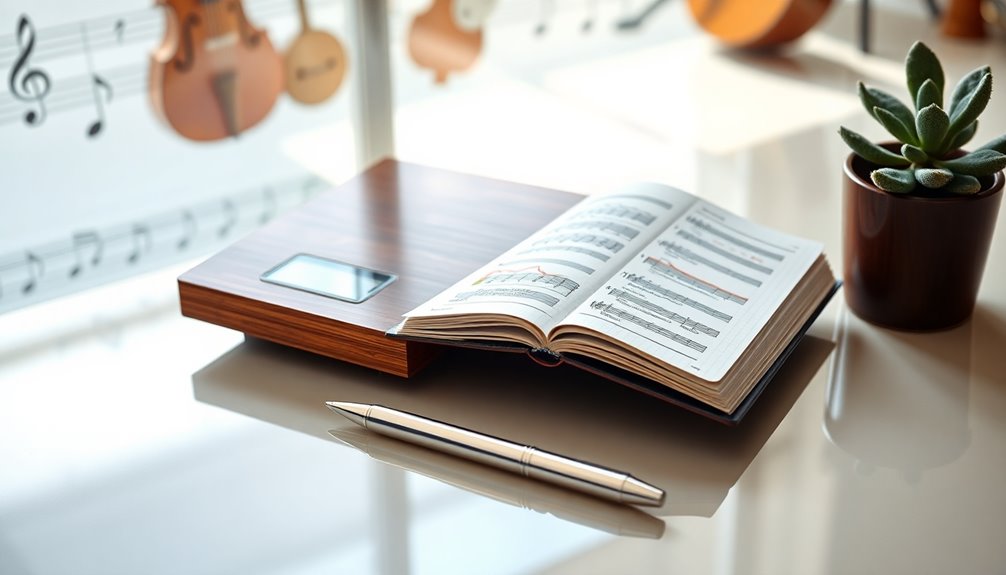If you're starting your musical journey, mastering scales is essential for building proficiency. Scales improve your finger dexterity and coordination while deepening your understanding of music theory. Begin with major and minor scales, then explore the chromatic, pentatonic, blues, and whole tone scales. Incorporate consistent practice techniques, like using a metronome and setting specific goals. Watch out for common mistakes, such as neglecting rhythm or overstressing speed. Keep a practice log to track your progress and celebrate your achievements. Stick around, and you'll uncover even more tips to elevate your scale mastery and overall musicianship.
Key Takeaways
- Understand the types of scales, focusing on major and minor scales as foundational elements of music theory and practice.
- Incorporate daily scale exercises into your routine, emphasizing accuracy and technique over speed for effective learning.
- Utilize a metronome to develop consistent timing and rhythm, which are crucial for proficient scale practice.
- Track your progress with measurable goals and a practice log to evaluate improvements and maintain motivation.
- Explore varied practice techniques, including playing scales in different rhythms and dynamics, to enhance versatility and skill development.
Importance of Scales

When you immerse yourself in the world of music, understanding the importance of scales is essential for your growth as a musician. Scales form the backbone of your musical foundation, providing a structured way to explore melodies and harmonies. They help you internalize the relationships between notes, making it easier to create and understand music.
By practicing scales regularly, you're not just honing your technical skills; you're also developing your ear and improving your finger dexterity. This groundwork allows you to play more complex pieces with confidence. Think of scales as the building blocks of your musical journey; each one opens up new possibilities for expression and creativity.
Moreover, scales are universal across different genres, so whether you're drawn to classical, jazz, or rock, mastering scales will enrich your playing experience. As you progress, you'll notice how scales help you improvise, compose, and even collaborate with other musicians. Additionally, practicing scales can increase finger coordination significantly, enhancing your overall proficiency.
Additionally, scales can be a source of connection with fellow musicians. Sharing your insights and experiences around scales can create a sense of belonging within a musical community. You'll discover that others face similar challenges and triumphs, which fosters a supportive environment where everyone can grow together.
In essence, investing time in understanding scales isn't just about improving your technical skills. It's about laying a solid musical foundation that will carry you through every stage of your musical journey.
Types of Scales

Understanding the various types of scales is essential for expanding your musical vocabulary and enhancing your playing skills. Each scale offers unique sounds and emotions, allowing you to express yourself in different ways.
Here's a brief overview of some fundamental scales you should know:
- Major Scale: This scale is often described as happy or bright. It consists of seven notes and follows a specific pattern of whole and half steps. The major scale is the backbone of much Western music.
- Minor Scale: In contrast to the major scale, the minor scale evokes a more somber or melancholic feel. It also has seven notes but differs in its intervals, giving it a distinct character.
- Chromatic Scale: This scale includes all twelve pitches within an octave. It's useful for adding color and complexity to your playing, as it allows for smooth shifts between notes.
Other scales like the pentatonic scale (which consists of five notes), the whole tone scale (composed entirely of whole steps), and the blues scale (a variation of the minor scale with added notes for a bluesy feel) also play significant roles in various musical genres. Additionally, incorporating diverse repertoire into your practice can enhance your understanding and application of these scales in various musical contexts.
Practicing Techniques

Mastering scales requires not just knowledge but also effective practicing techniques that can enhance your proficiency and confidence. To start, incorporate scale exercises into your daily routine. These exercises not only strengthen your fingers but also improve your familiarity with different scales. Aim to practice a variety of scales, including major, minor, and modal scales, to develop a well-rounded skill set.
Next, explore technique variations to keep your practice engaging. For instance, try playing scales in different rhythms or dynamics. This approach challenges you to think creatively while reinforcing your technique. You can also practice scales using different articulations, such as legato and staccato, to develop control and expression in your playing.
Another effective technique is to use a metronome. Start slowly to guarantee precision, then gradually increase the tempo as you become more comfortable. This method helps you develop a strong sense of timing, which is essential for any musician. Utilizing a metronome can assist in maintaining consistent rhythm and improving overall timing skills, a crucial tool for musicians.
Additionally, consider practicing scales in intervals or broken patterns. This variation can help you identify notes more easily and improve your ear training.
Lastly, don't forget to set specific goals for your practice sessions. Whether it's mastering a new scale or refining a technique variation, clear objectives can keep you motivated. Remember, the journey to proficiency is gradual, and celebrating small milestones along the way fosters a sense of belonging in the musical community.
Embrace these techniques, and watch your skills flourish!
Common Mistakes

Many beginners encounter common pitfalls when practicing scales, which can hinder their progress. Recognizing these mistakes is the first step in overcoming them. Here are three key errors you should avoid:
1. Over practicing techniques: It's easy to fall into the trap of repeating the same scale over and over, thinking you'll improve faster. However, this can lead to frustration and fatigue.
Instead, focus on quality over quantity. Set specific goals for each practice session and vary your exercises to keep things fresh.
2. Neglecting rhythm: Scales aren't just about hitting the right notes; they're also about maintaining a steady rhythm. Beginners often overlook this vital aspect.
Use a metronome to help you stay in time and develop a strong sense of pulse. This will enhance your musicality and guarantee your scales sound more polished. Regular practice of effective practice techniques can significantly improve your scale proficiency.
3. Skipping the fundamentals: Many new players rush into advanced techniques without mastering the basics.
Don't skip foundational exercises like finger placement and hand coordination. These skills are essential for your long-term success and will make learning more complex scales much easier down the line.
Progress Tracking

As you dive deeper into your scale practice, tracking your progress becomes essential for growth and motivation. It's not just about hitting the right notes; it's about setting clear goals and regularly evaluating how far you've come.
Start by establishing specific, measurable objectives for your scale practice. Whether it's mastering a new scale each week or improving your speed, having concrete goals will give you direction.
Once you've set your goals, create a progress log. This can be as simple as a notebook or a digital app where you record your daily or weekly practice sessions. Note what you worked on, how you felt, and any breakthroughs or challenges you faced. This isn't just about numbers; it's about reflecting on your journey and recognizing your growth.
Regularly review your logs to evaluate your progress. Ask yourself: Are you meeting your goals? What adjustments can you make to your practice routine? This evaluation process allows you to celebrate your achievements, no matter how small, and helps you stay motivated. Additionally, setting clear, measurable goals provides direction and motivation for practice, ensuring you stay focused on your objectives.
Frequently Asked Questions
How Long Should I Practice Scales Each Day?
When you're wondering how long to practice scales each day, aim for at least 15 to 30 minutes.
This timeframe allows you to incorporate effective techniques that build your skills while keeping your motivation high.
Break your practice into smaller segments, focusing on different scales or patterns each session.
Consistency is key, so make daily practice a part of your routine, and you'll see progress while feeling connected to others on the same journey.
Can Scales Be Applied to Improvisation?
Yes, scales can definitely be applied to improvisation!
When you use scale improvisation, you tap into a structured framework that boosts your creative expression. By understanding the scales, you can explore different musical ideas on the fly, allowing you to create unique melodies and harmonies.
What Instruments Can I Practice Scales On?
You can practice scales on a variety of instruments to enhance your musical skills.
Piano scales are great for building finger dexterity and understanding harmony. If you play guitar, practicing guitar scales will improve your improvisation and soloing techniques.
For brass instruments, scales help with tone quality and intonation, while woodwind scales develop your breath control and agility.
No matter which instrument you choose, mastering scales is essential for any musician's journey!
Are There Apps for Learning Scales?
Absolutely, there are plenty of music apps designed to enhance your scale learning.
You can explore apps like Yousician or Simply Piano, which offer interactive lessons and feedback. These platforms make practicing scales engaging and fun, allowing you to progress at your own pace.
Plus, they often have community features that let you connect with others on the same journey.
How Do I Know When I'm Proficient?
To know when you're proficient, use self-assessment techniques like recording yourself and comparing your performance to proficiency benchmarks.
Listen for clarity, timing, and accuracy. Set specific goals and track your progress over time; this helps you see improvement. Engaging with peers can also offer feedback and motivation.
Conclusion
In summary, mastering scales is essential for your musical proficiency. Did you know that musicians who practice scales regularly improve their overall playing speed by up to 30%? By incorporating the techniques and tips we've discussed, you'll not only enhance your technical skills but also gain confidence in your performance. Remember to track your progress and stay mindful of common mistakes. With dedication and practice, you'll access new levels of musical expression and creativity. Keep practicing!






